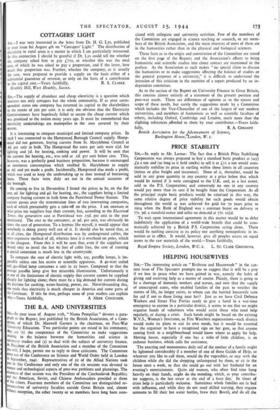PRICE STABILITY
Snt—In reply to Mr. Lomas : The fact that a British Price Stabilizing Corporation was always prepared to buy a standard basic product at (say) a a ton and (so long as it held stocks) to sell it at LI I a ton would auto- matically stabilize its price in sterling within those limits in all countries (minus or plus freight and insurance). None of it, thereafter' would be sold in any great quantity in any country at a price below that which would be netted if it were consigned to the U.K. and, as a last resort. sold to the P.S. Corporation; and conversely no one in any country would pay more than its cost if he bought from the Corporation. As all die principal staple basic products would be valorised in this way, the same relative degree of price stability for such goods would obtain throughout the world as was achieved for gold for 70 years prior to 1914 when the Bank of England was a constant buyer on delivery at 77s. 9d. a standard ounce and. seller on demand at 77s. told.
To wait upon international agreement in this matter would be to defer indefinitely the application of a world-wide benefit that could be auto- matically achieved by a British P.S. Corporation acting alone. There . would be nothing coercive in its policy nor anything monopolistic in in- tention or in effect It would, however, give all peoples access on equal terms to die raw materials of the world.—Yours faithfully, Royal Empire Society, London, W.C. 2. L. Sr. CLARE GRONDONA.


























 Previous page
Previous page